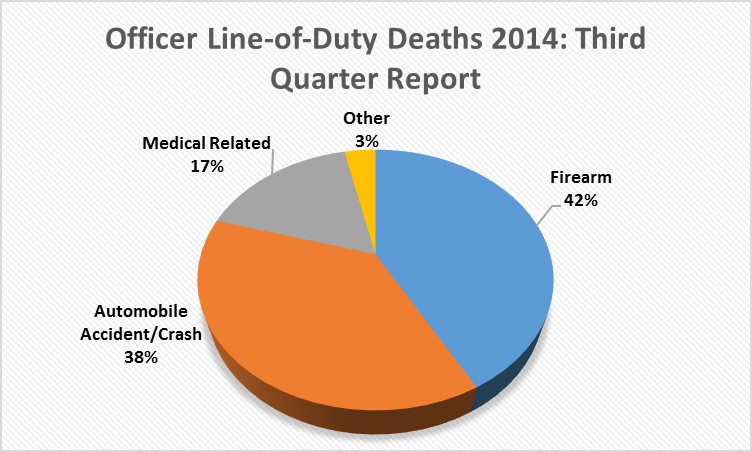2014 Line-of-Duty Deaths: Third Quarter Report
Since the beginning of 2014, there have been a total of 90 line-of-duty deaths within the law enforcement community in the United States. The IACP compiled data from both The Officer Down Memorial Fund and the National Law Enforcement Officers Memorial Fund.
Of the 90 fatalities:
Consistent with the IACP 1st and 2nd quarter reports for 2014, firearms and traffic-related incidents continue to account for the majority of line-of-duty officer deaths.
Of the 34 traffic-related fatalities:
It is the IACP’s position that no injury to or death of a law enforcement professional is acceptable, and the IACP Center for Officer Safety and Wellness strives to improve awareness on all aspects of officer safety. To learn more and to share best practices pertaining to officer safety and wellness please visit http://www.iacp.org/CenterforOfficerSafetyandWellness or contact the Center staff at [email protected].
Of the 90 fatalities:
- 38 were the result of firearms-related incidents
- 34 were the result of traffic-related incidents
- 15 were the result of medical-related incidents
- 3 were the result of other miscellaneous incidents
Consistent with the IACP 1st and 2nd quarter reports for 2014, firearms and traffic-related incidents continue to account for the majority of line-of-duty officer deaths.
Of the 34 traffic-related fatalities:
- 25 officers were killed in automobile crashes
- 6 officers were struck and killed while outside their vehicle
- 3 officers were killed in motorcycle crashes
- 36 officers were killed feloniously, 16 of which can be classified as ambushes
- 2 officer was killed by accidental gunfire
- Violence Against the Police– The IACP and the Bureau of Justice Assistance disseminate actionable information and resources to prevent felonious assaults against law enforcement.
- Ambush Project– The IACP, along with CNA, conducted research on officer ambushes, which will be used to create policy guidelines for future prevention of ambush attacks.
- Gun Violence Reduction– an initiative with the priority of offering training and providing technical assistance to police officers in order to enhance their gun violence reduction strategies.

It is the IACP’s position that no injury to or death of a law enforcement professional is acceptable, and the IACP Center for Officer Safety and Wellness strives to improve awareness on all aspects of officer safety. To learn more and to share best practices pertaining to officer safety and wellness please visit http://www.iacp.org/CenterforOfficerSafetyandWellness or contact the Center staff at [email protected].
